Black Myth: Wukong is easily among the best and best-looking action RPGs I've played in years, and after 2 hours hands-on I see why the devs don't call it a Soulslike
Hands-on preview | Black Myth: Wukong impresses with sharp combat and a wondrous world
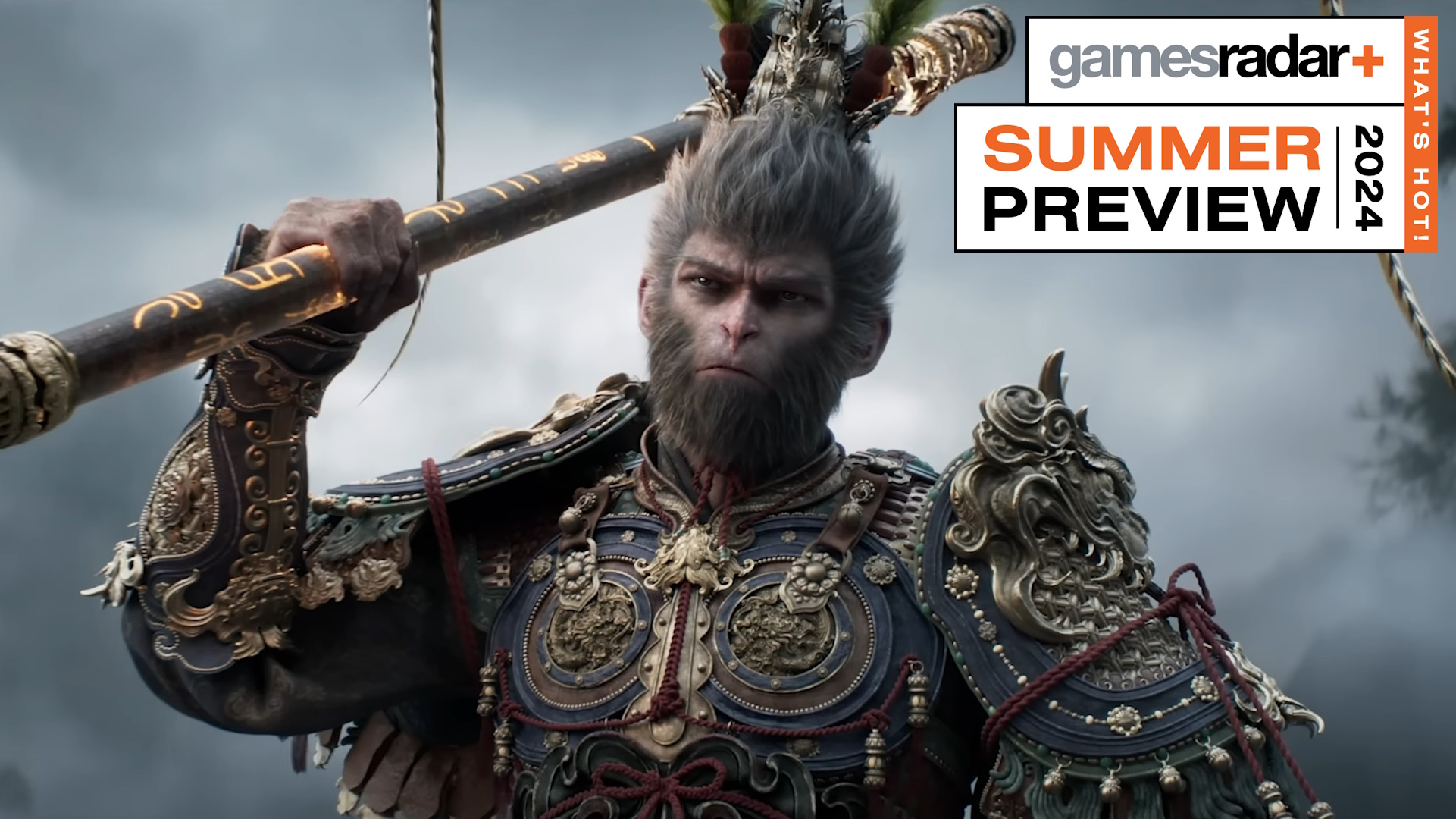
Black Myth: Wukong developer Game Science just calls this game an action RPG. It specifically doesn't call it a Soulslike, and I kind of see what it means. This is a game where you fight plentiful bosses, dodge a lot while budgeting stamina, and rest at bonfire-esque checkpoints to refill your upgradeable healing flask. But is that all that defines a Soulslike? I would say no, partly because a lot of game developers have told me as much. And this is also a game with skill trees, color-coded gear rarities, one main weapon, and more linear level design, which all clash with the Souls bible (FromSoftware's black sheep Sekiro notwithstanding).
That's based on two hours with a slightly condensed Summer Game Fest demo that's highly subject to change, but Black Myth: Wukong feels more like the modern God of War games and less like Dark Souls so far. It also feels great to play, looks stupidly good in motion, and might be the best action RPG I've experienced since Lies of P.
Summer Games Preview
We're diving into the hottest upcoming games out of Summer Game Fest. To find all of our hands-on reports, visit GamesRadar's What's Hot 2024 hub.
Black myth
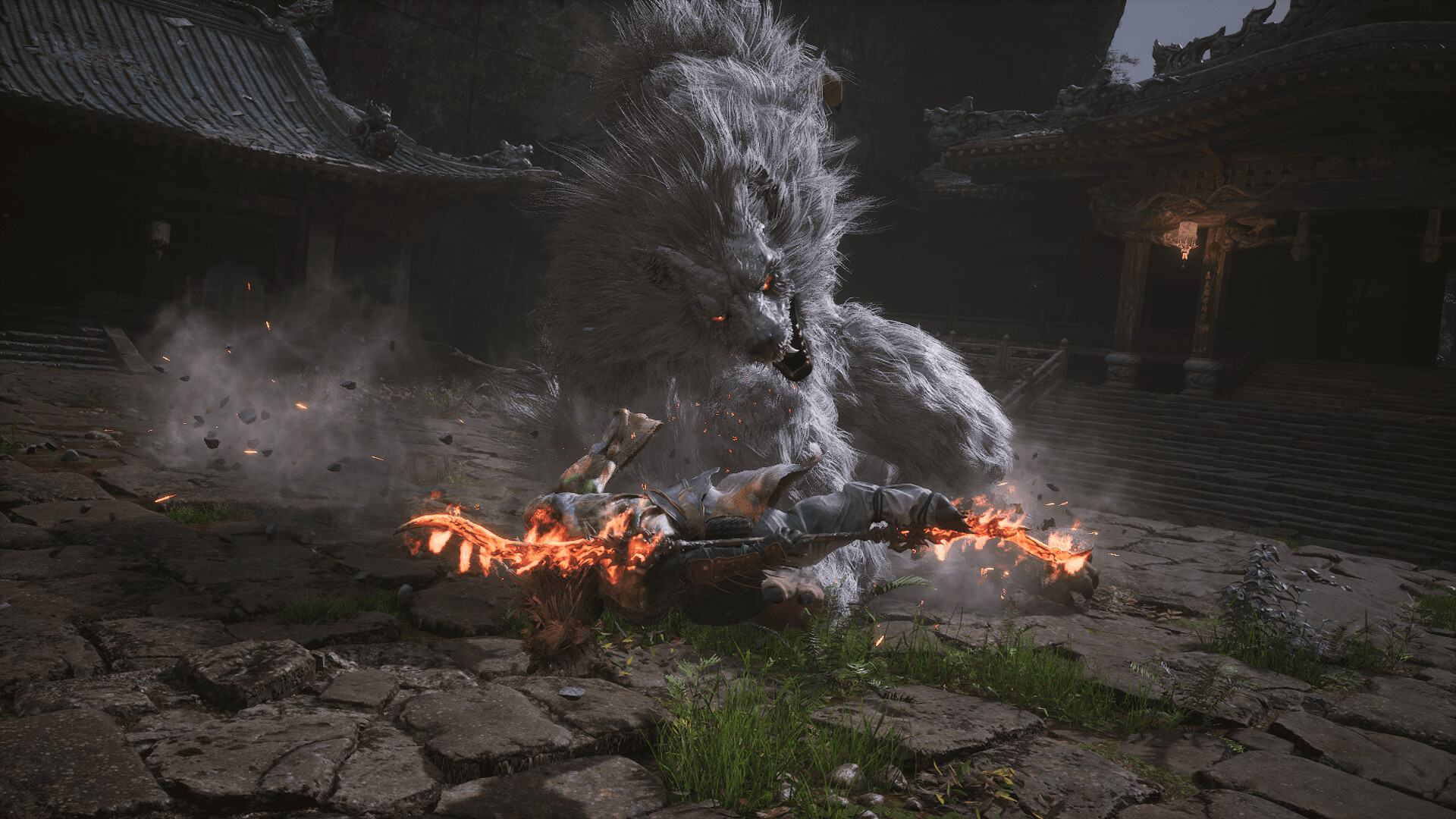
My demo begins with a monkey hero referred to as the Destined One, Wukong, based on the titular Sun Wukong from Journey to the West, clobbering kobold-like canine warriors in a sun-dappled forest on Black Wind Mountain. Immediately, two of Black Myth: Wukong's strengths come into focus: a fantasy setting that's gone woefully untapped in games, and Unreal Engine 5 graphical voodoo which renders that setting in painstaking detail without hurting frame rate (played on what seemed like a beefy PC).
The problem is that levels are so incredibly detailed that it's frequently unclear which areas are actually explorable, so I ran into loads of invisible walls and dead ends. That said, exploration was pretty minimal because the demo felt more like a boss rush with short sightseeing intermissions. I'm told the full game is more open with several side paths, NPC quests, and secrets, but the world of Black Myth: Wukong doesn't give me a Dark Souls, let alone Elden Ring, kind of vibe. It is, however, a fascinating place.
Inspired by the novel Journey to the West, Black Myth: Wukong revels in the refreshing and curious quirks of Chinese mythology, from shapeshifting shenanigans like turning yourself into a peach or your hair into a stick of incense, to wandering wonders introduced with utmost casualness. It presents a world where such phenomena are common and expected, so much so that they're not even worth a raised eyebrow from the people – the beast people and demons and other Yaoguai – who reside here. Characters of all shapes and sizes bend reality as readily as you or I would make a phone call. It's the best kind of magic: surreal and varied, not just fireballs and lightning bolts. This is an iconic tale rewritten, but Black Myth: Wukong retains the engrossing draw of mysticism made common.
Brief as the demo was, and as frantically as I rushed through it hoping to see as much content as possible, I didn't get the firmest grasp on the story. What impressed and often surprised me more is how Black Myth: Wukong handles combat: with a humble-looking staff in hand, and an arsenal of tricks behind it.
Wukong
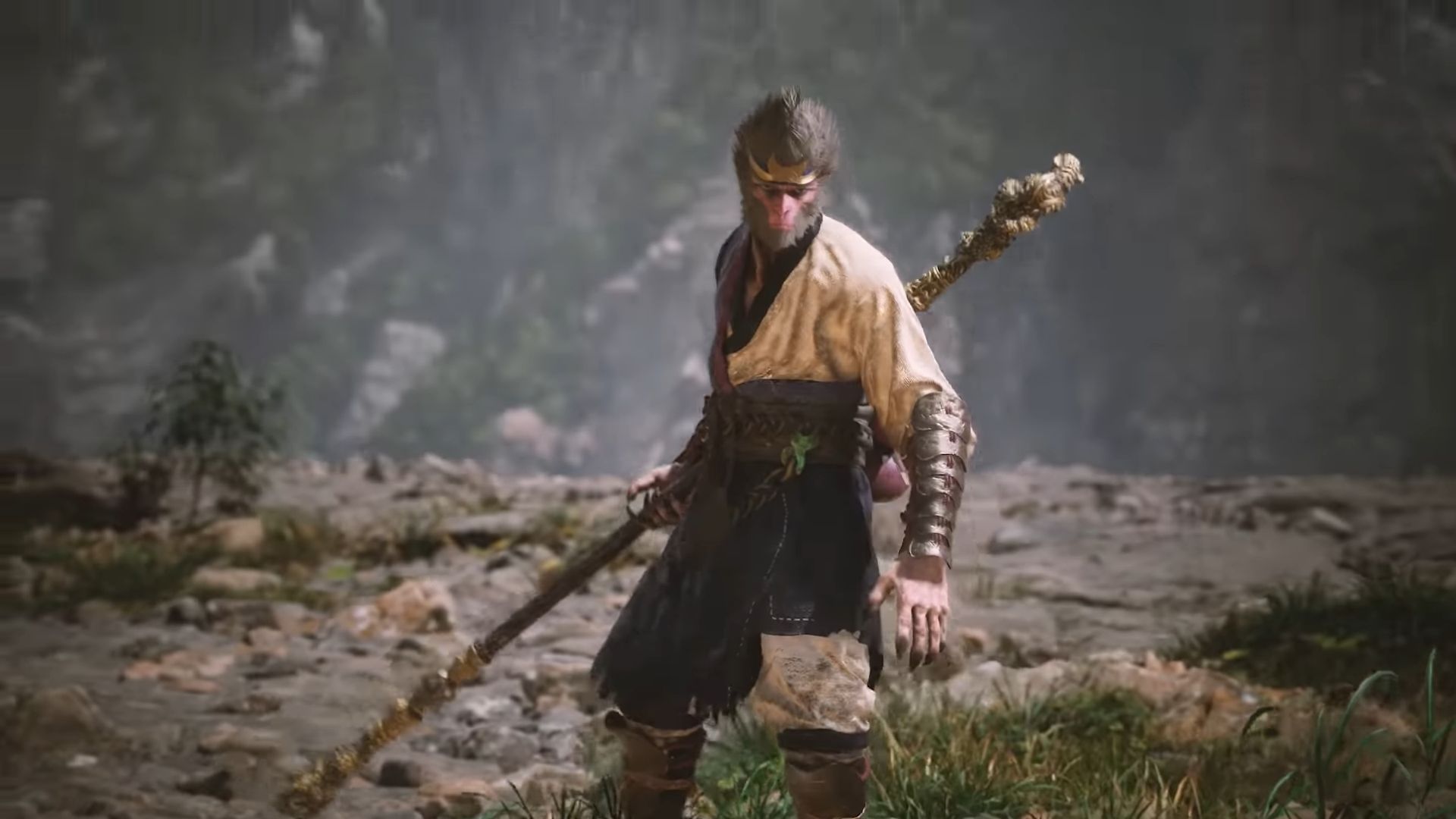
Out of the box, even with no upgrades on its expansive skill tree, Black Myth: Wukong is kinetically satisfying. Still, it took some getting used to. The dodge feels responsive and forgiving, but for the perfect dodge, it almost seems like you have to dodge when you get hit rather than right before an attack connects. It's like wading into cold water: uncomfortable and a little scary at first, but once you're in, perfect-dodging is actually pretty nice. There's no real parry; it's all dodging all the time. You can at least twirl your staff to deflect some ranged attacks, like a ridiculous rapid-fire arrow salvo from one standard enemy who frankly deserves a promotion.
Sign up to the GamesRadar+ Newsletter
Weekly digests, tales from the communities you love, and more
Light attacks come out quickly, flow well, and sound terrific – the thwip of your staff catching the air, the woody thunk of pummeling enemies – but heavy attacks are a bit of a misdirect. You don't have heavy attacks in the traditional sense. You have charged attacks and combo breakers which should only be used in certain ways. If you tap the heavy attack normally, you'll get locked into a long animation for a swing that doesn't deal much damage. I got the sense that you aren't supposed to do this at all. Instead, you should hold the heavy button for a moment to build up a charge, then use that charged attack as an opener or gap closer. There's a great tempo to it. A charged attack was enough to one-shot or heavily stun most basic enemies I encountered, so I got a lot of use out of it.
One of the first upgrades I bought – spending skill points which, in not-Soulslike fashion, use XP not lost as a bloodstain on death – was the ability to build a charge while sprinting, almost like the hammer in Monster Hunter. Reader, I did not regret this decision. Granted, I didn't regret any upgrades because you can reset your skill tree whenever, but this is a core ability. I was also quick to improve the speed and distance of my dodge, reduce the stamina cost of dodging and sprinting, and ensure dodging doesn't interrupt my light combo.
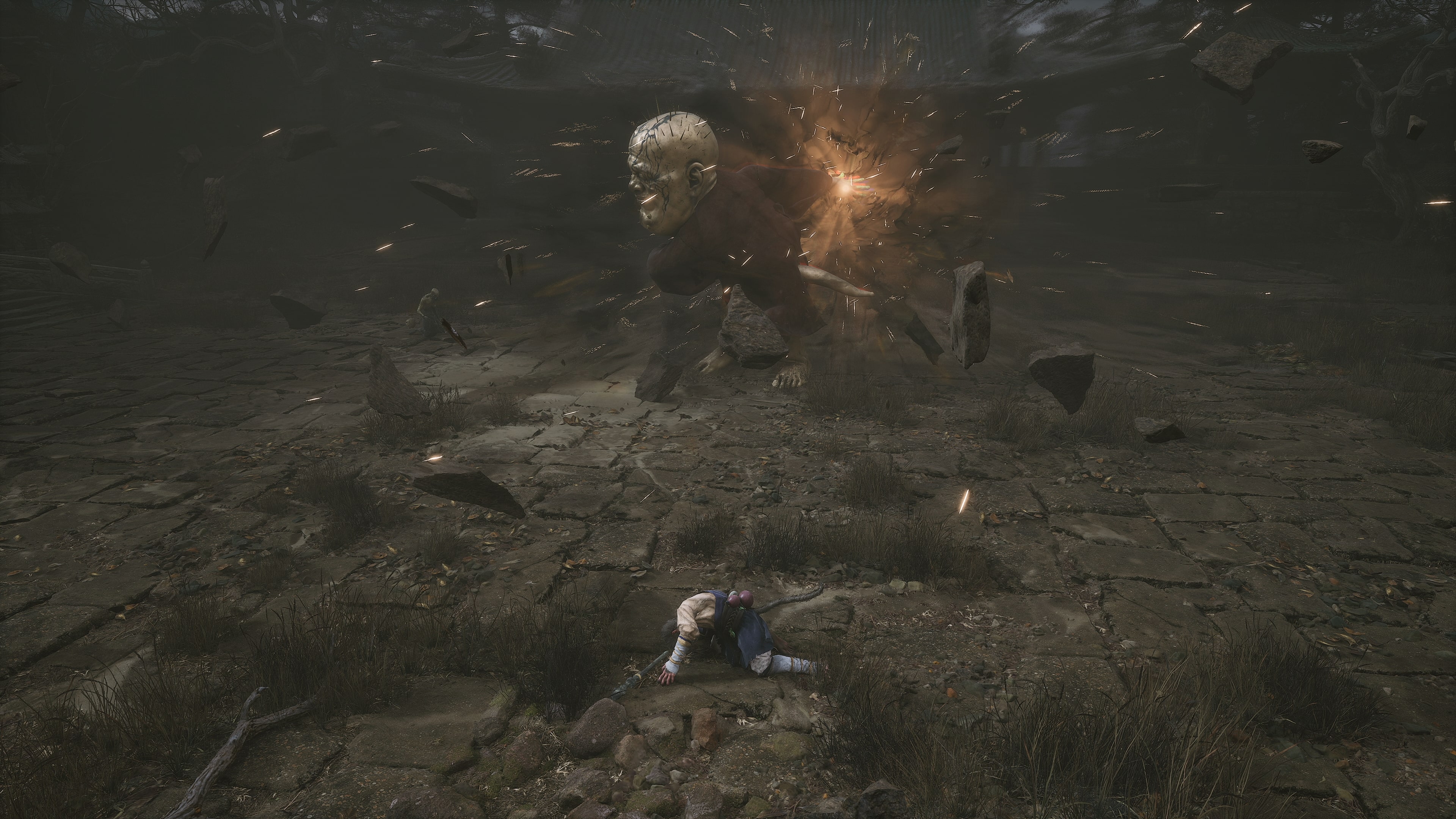
Bosses forced me to play differently. I beat the seven or so bosses I encountered (minus a hidden one I can't talk about), which ranged from hulking beasts to nimble spellcasters, and each fight had a distinct rhythm. Some were humanoid and unleashed long weapon combos that forced me to dodge repeatedly. Others were lumbering giants that wield Herculean strength capable of devastating AoE attacks that demand careful positioning.
These were all superbly animated, with clear tells. Even on my first attempt – and I was able to beat several bosses in one attempt, though others took upwards of five because this game does have some bite – I could get a sense of how they'd move and when to dodge. On a personal note, I was relieved to see very few of the absurdly delayed, dodge-baiting attack animations that have infected so many modern action RPGs.
Wukong quickly becomes an impressively agile character, and from the lock-on camera to dodge animations to enemy stagger, the game nails it in the combat. If this was a Soulslike, it would probably be the best one since Lies of P – the best Soulslike ever made, for my money – based on this demo. And we haven't even really gotten to progression.
Monkey business
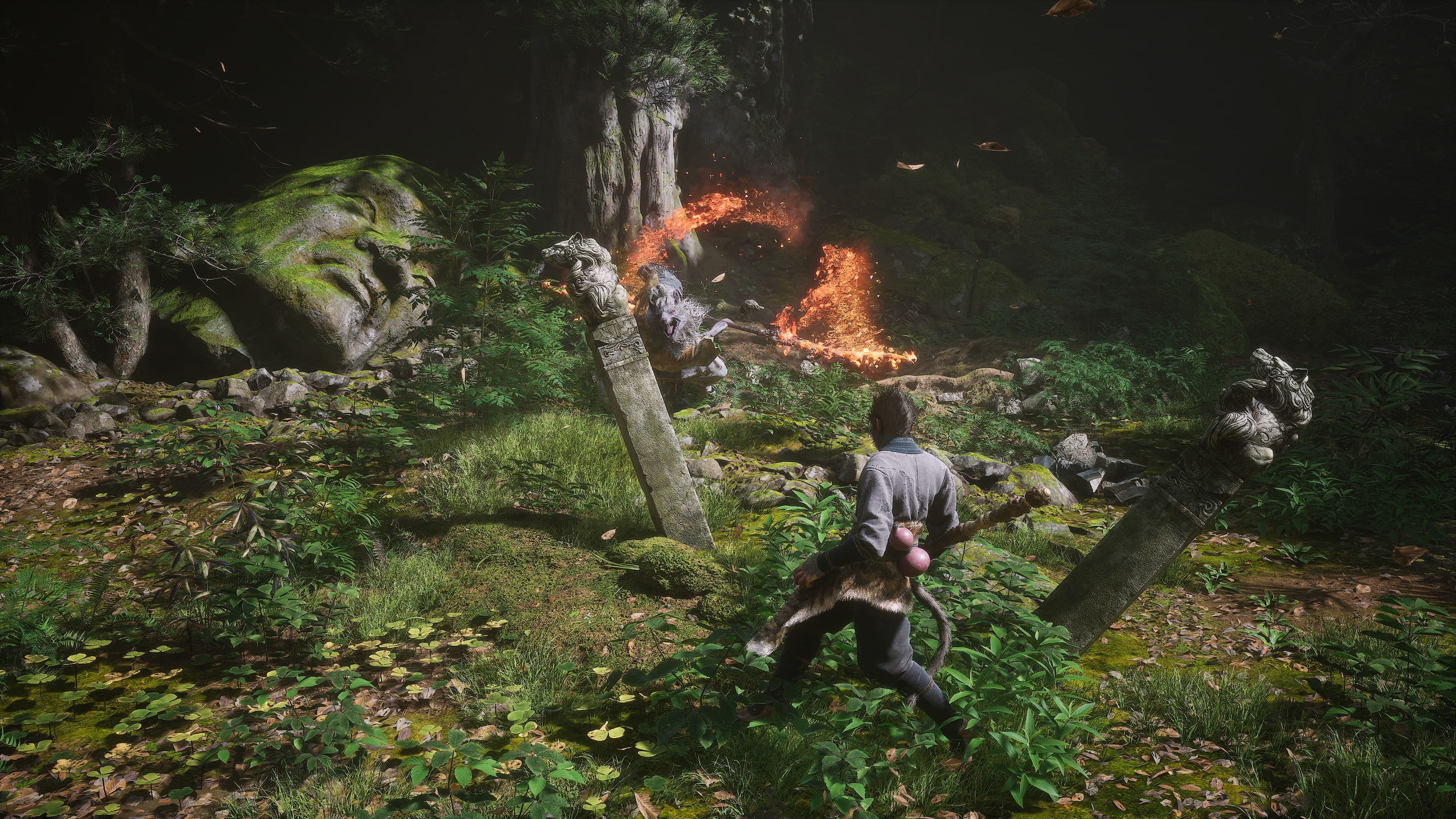
From what I saw, there are three skill trees: one for spells (which was unavailable in the demo), one for generalist benefits, and one for three staff fighting styles. I leaned more on the passive bonuses, but I did dabble in staff actions a bit. One upgrade improved the range of my opening light attack, and another gave me a combo breaker heavy attack that spends an energy point accumulated primarily by dealing damage and perfect-dodging attacks. If you have energy, you can also use it to instantly build up a charged attack, which creates an interesting dynamic for how to spend this resource. I preferred using charged attacks when I didn't have energy in the bank, but there are strategies for both.
I've focused on the default fighting style so far, but there are two others which you can swap to at any time
With a few upgrades, I automatically unlocked a second energy slot, and with it, a higher tier of charged attack. I could then acquire a follow-up attack to the aforementioned combo breaker, which hits much harder but requires two points of energy to pull off. Another upgrade that basically eliminates incoming damage during the initial animation made this much easier to land during boss fights, and this heavy combo became my go-to way to spend energy. Open with charged attacks, sneak in light combos, and spend my energy on combo breakers. Energy attacks heal you a little bit, too, which is nice.
I've focused on the default fighting style so far, but there are two others you can swap to at any time using the D-pad, not unlike Ghost of Tsushima. One was hidden in the demo and only unlocked at level 20 anyhow, but I did get to sample the other one, which swaps your charged attacks to a pillar stance. Wukong now uses his staff like a totem pole, sitting calmly at the top while enemies bash the bottom and chip away at your stamina. This stance completely dodges most melee attacks, and you only ascend higher as your staff builds up energy and extends. You can use that stored energy to land heavy slams with much greater reach.
I'm told you can further modify the staff through equippable items (which I never found, crafted, or otherwise saw). Your play style gains additional layers through armor pieces with stat bonuses as well as more interesting set bonuses, all color-coded like most loot games as rares and epics and so on. I found a circlet that let me chug healing gourds while sprinting, and this came in clutch for several fights.
Where the magic happens
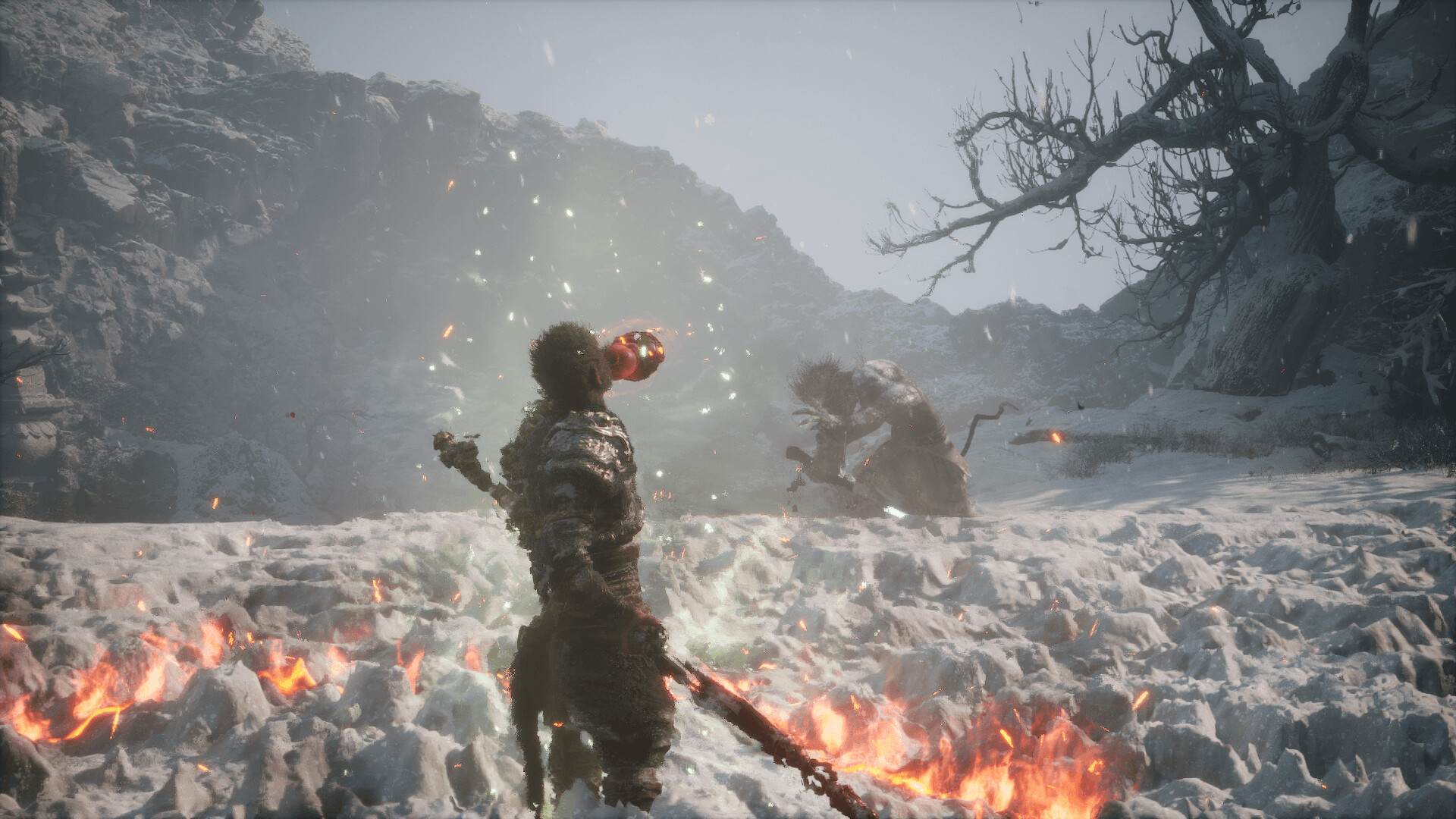
For me, the magic moment was the reveal of the actual magic system. The first spell you get, just minutes into the game (or at least into the demo), is called Immobilize. It freezes enemies, including bosses, in place for a few seconds, and it's every bit as powerful as it sounds. Freeze them, walk behind them so they whiff when they unfreeze, and get in some free hits. One Immobilize is usually enough time to delete any normal enemy or get a full combo in on a boss. This feels like cheating, and you get to do it all the time. It has a long cooldown (50 seconds, I believe), a short duration, and limited use cases - you can't freeze a boss during most attack combos, for example - but we're talking about the ability to freeze time here. This is the first spell in the game! And it doesn't even cost much mana!
There are four slots for spells, and I'm told multiple spells will eventually compete for each slot. It's hard to imagine ever dropping Immobilize, but I'm more flexible when it comes to transformation spells. After beating one early boss, a fire glaive-wielding wolf man named Guangzhi, I unlocked a spell with a very long cooldown that let me assume his form for a limited time. This essentially gives you a second health bar because your transformation has its own HP pool, and 'dying' just pops you back to monkey form. As Guangzhi, you can slice enemies with fast combos that feel weaker than your staff but also apply potent burn damage.
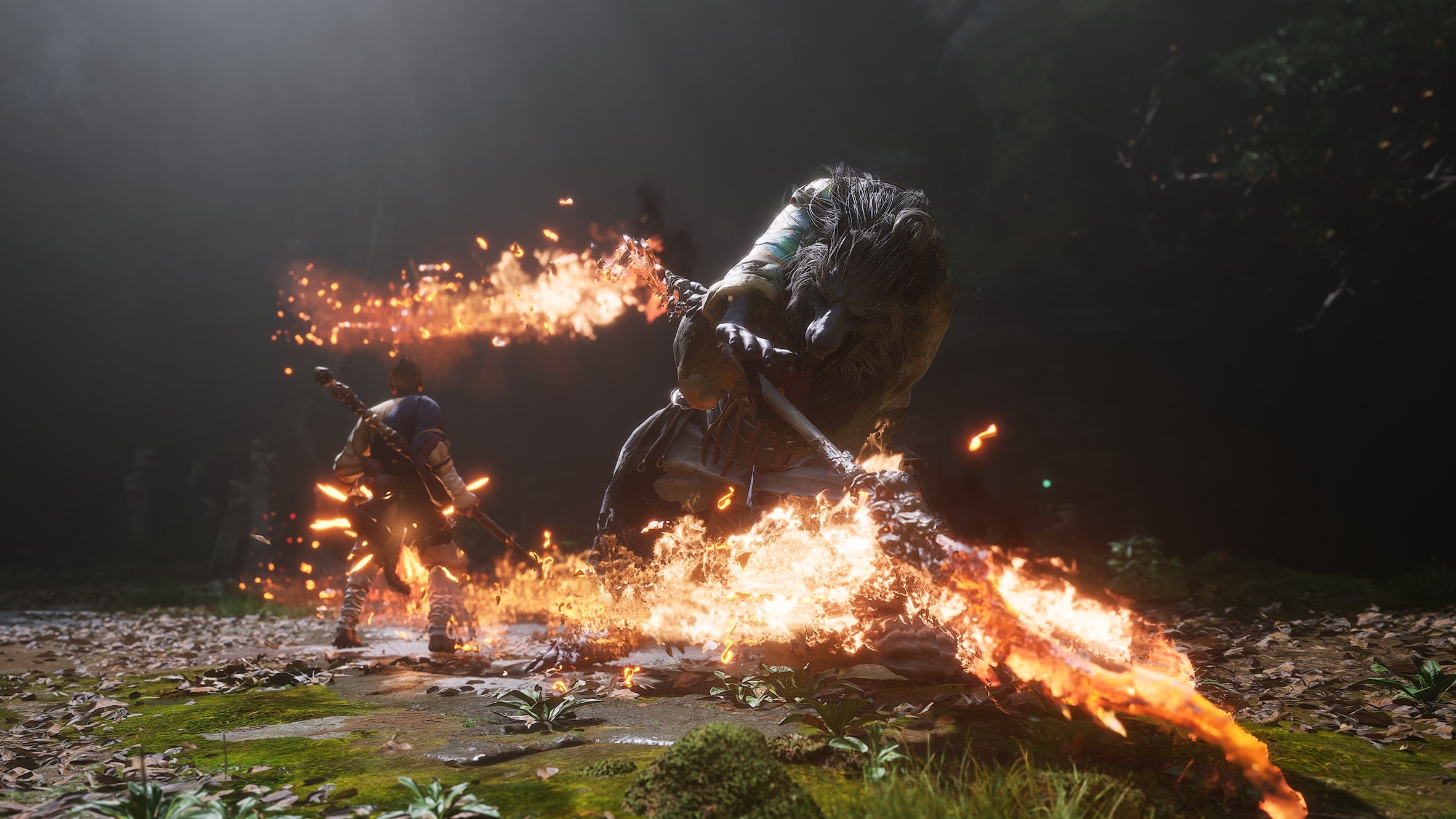
Absorbing damage for free while dealing meaningful damage yourself gives transformation spells powerful utility. Against some bosses, I'd open with Immobilize, immediately transform, set them ablaze while they're still frozen, and usually have Immobilize back off cooldown by the time my transformation was undone. Guangzhi's form felt much clunkier than the Destined One, especially when it comes to dodging, but it's a powerful spell. I can't wait to see what and who else you can turn into, and to figure out which form I want to bring for a fight. Other loadout decisions include which bonus to add to your healing gourd, like curing poison or extra healing.
Black Myth: Wukong is the latest promising action epic to come from China, which has long been dominated by mobile games but is increasingly finding global success and attention on console and PC. It's the most-wishlisted game on Steam and one of the most-hyped games of the year. After playing it for two hours, I'd say its reputation is largely deserved. This is good stuff, maybe even great. Much remains to be seen in the full game, but as a first bite, this demo was delicious - easily one of the best things at SGF.
Black Myth: Wukong is coming to PS5 and PC on August 20, with the Xbox Series X|S version coming at a later date due to optimization issues.

Austin has been a game journalist for 12 years, having freelanced for the likes of PC Gamer, Eurogamer, IGN, Sports Illustrated, and more while finishing his journalism degree. He's been with GamesRadar+ since 2019. They've yet to realize his position is a cover for his career-spanning Destiny column, and he's kept the ruse going with a lot of news and the occasional feature, all while playing as many roguelikes as possible.



